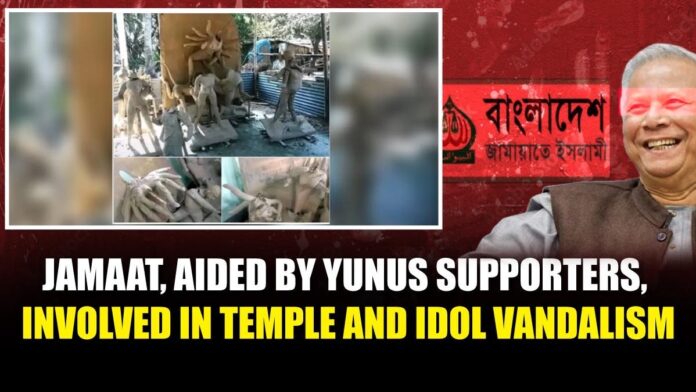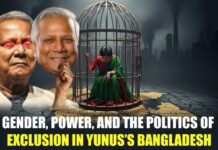On the eve of Durga Puja, incidents of temple and idol vandalism are rising across several districts of Bangladesh, creating fear and tension within the minority Hindu community. In September, attacks were reported in at least 13 districts, totaling more than 15 incidents. Analysts describe these as planned conspiracies by militant groups that threaten the secular spirit of the Liberation War and national unity. The Bangladesh Hindu Buddhist Christian Unity Council alleges that the interim government of Muhammad Yunus has encouraged these attacks through its silence.
Details of recent attacks
According to the Unity Council and local media, between 2 and 27 September more than 50 attacks were reported across 13 districts. These included idol burnings, vandalism, and stone-throwing at temples. In the past two days alone, an additional ten incidents were reported from places including Patuakhali, Chapainawabganj, Satkhira, Madaripur, Kishoreganj and Narail. Viral photos and videos on social media appear to show militants involved in these attacks.
On 2 September, in Hamidpur and Sadullapur upazilas of Gaibandha, at night militants burned idols of Durga, Lakshmi, Saraswati, Kartik and Ganesh. Police opened an investigation after the local Hindu community protested. On 10 September, in Panchagarh and Satkhira, idols were vandalized at Kali temples on the same day and the accused were arrested, which sparked local unrest. On 14 September in Shovrupdah Palpara of Kushtia, the heads and hands of Kartik and Saraswati idols were smashed and CCTV footage was stolen.
On 16 September two idols were destroyed at Kandulia Kalibari in Netrokona, prompting the puja committee to demand increased security. On 17 September five to six idols were vandalized at the Kashimpur cremation-ground temple in Gazipur. Two teenagers were arrested and confessed. On 21 September seven idols were vandalized in Tariapara, Jamalpur, and one person was arrested with the help of CCTV footage. The same day there was an attack on the Madhupur Rokkha Kali temple in Munshiganj where police intervened.
On 23 September, violence broke out in Durgapur, Kurigram, over a toll dispute during idol transport. When members of the Hindu community blocked the road, the police stepped in. On 26 September videos circulated on social media showing stones thrown at mandaps in Rauzan and Noapara in Chattogram and attacks on idols during transport, provoking wide reaction. Between 25 and 26 September further incidents of vandalism and temple attacks were reported in Jhinaidah, Patuakhali, Chapainawabganj, Satkhira, Madaripur, Kishoreganj and Narail. On 27 September new attacks occurred in Natore, Manikganj and Chattogram. Police say investigations are ongoing and surveillance has increased, but the local Hindu community remains worried about its safety.
These incidents are being viewed as a serious blow to Bangladesh’s communal harmony and secular values. Observers warn that unless coordinated action by the government and all levels of society halts this militant activity, the country’s social peace could be endangered.
Militant strategy and impact
Those attacks by militant groups are not only a blow to minority communities but also inflict deep wounds on national communal harmony. Jayanto Kumar Dev, president of the Dhaka Metropolitan Public Puja Committee, said, “These attacks are a show of strength by militants, encouraged by the silence of the Yunus government. In the last year the Hindu community has been gripped by fear because of militant intimidation, rumors and attacks.”
Manindra Kumar Nath, secretary of the Unity Council, said, “These are planned attacks. Rumors are spread on social media to create an atmosphere of fear.” This year authorities planned 33,355 puja mandaps, more than 2,000 higher than last year. But there are fears that celebrations will be shadowed by anxiety.
An international human rights group, Asia News, reported that these incidents reflect organized militant activity aimed at spreading fear among minority festivalgoers.
Subrata Chowdhury, advisor to the Puja Celebration Council, said, “You do not need a calendar to know when Janmashtami, Durga Puja or Saraswati Puja are coming. When idols start being vandalized you know the festival season has begun.” He added that the conspirators aim to take away the courage to protest from minority communities and to create social division.
How Yunus is allegedly supporting them
Experts say that political upheaval allowed 209 prisoners to escape from Kashimpur high security prison and that convicted militants were freed in Narsingdi, marking major failures of law enforcement. The authorities have not taken steps to recapture them. Under Yunus’s tenure, the banned group Hizb ut-Tahrir openly organized a “Khilafat March” in Dhaka and law enforcement failed to stop it. Sources say Yunus’s associates were involved in these events. He reportedly told the Jamaat leader on a phone call that Jamaat was his preferred party. That remark, analysts say, makes it clear that Yunus is supporting Jamaat’s militant activities.
Government and social response
From the government side, chief adviser Muhammad Yunus, the army chief and the home affairs adviser have all offered assurances of peaceful puja celebrations. A total of 430 Border Guard Bangladesh teams have been deployed to guard 2,857 puja mandaps. Still, Unity Council and puja committee leaders say “five days of security is not enough. Year-round protection is necessary.” Bashudeb Dhar, president of the Puja Council, warned that without swift identification and punishment of attackers, stronger temple security, and measures to stop rumors, the situation will deteriorate.
The Awami League condemned the attacks and demanded punishment for the perpetrators while calling the Yunus government an “illegal usurper.” Analysts say that preserving secular values will require the joint effort of religious leaders, academics, media and civil society. Human rights organizations have been urged to intervene to protect minority rights.
Bangladesh’s history shows religious fanaticism does not last. But these attacks threaten the whole nation. Unity Council and local leaders have called on the government to take strict action, punish the guilty and provide year-round security. Now is the time to unite and build resistance against militancy so Bangladesh’s secular spirit and social harmony remain intact.




